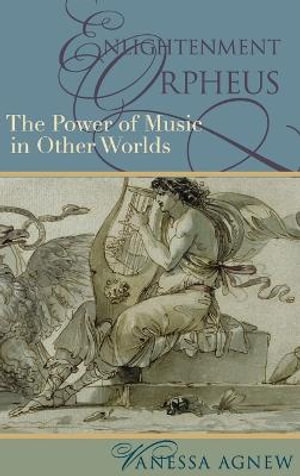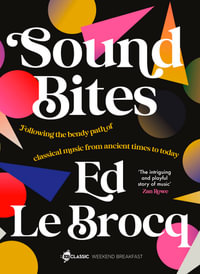The Enlightenment saw a critical engagement with the ancient idea that music carries certain powers - it heals and pacifies, civilizes and educates. Yet this interest in musical utility seems to conflict with larger notions of aesthetic autonomy that emerged at the same time. In Enlightenment Orpheus, Vanessa Agnew examines this apparent conflict, and provocatively questions the notion of an aesthetic-philosophical break between the eighteenth and nineteenth centuries.
Agnew persuasively connects the English traveler and music scholar Charles Burney with the ancient myth of Orpheus. She uses Burney as a guide through wide-ranging discussions of eighteenth-century musical travel, views on music's curative powers, interest in non-European music, and concerns about cultural identity. Arguing that what people said about music was central to some of the great Enlightenment debates surrounding such issues as human agency, cultural difference, and national identity, Agnew adds a new dimension to postcolonial studies, which has typically emphasized the literary and visual at the expense of the aural. She also demonstrates that these discussions must be viewed in context at the era's broad and well-entrenched transnational network, and emphasizes the importance of travel literature in generating knowledge at the time.
A new and radically interdisciplinary approach to the question of the power of music - its aesthetic and historical interpretations and political uses - Enlightenment Orpheus will appeal to students and scholars in historical musicology, ethnomusicology, German studies, eighteenth-century history, and comparative studies.
Industry Reviews
"Vanessa Agnew is the first since James Cook to take seriously the Royal Society's emphasis on the importance of playing music to natives as a way of soothing and rendering them receptive to their visitors. She gives detailed descriptions of chants and dances in the voyages of discovery in the South Seas, not just as pastimes and amusements but as deliberate elements of a colonial enterprise. To notice this has been Agnew's first triumph. To consider how
native music contributes to a comparative critique of a national standard of music is her second. Thus 'earwitnessing' is conceived of in the same terms as Mary Louise Pratt's eyewitnessing, namely a far
from disinterested aesthetic activity that has many colonial jobs to perform. That local musical scales were actually used in systems of racial classification I find a truly astounding fact. Agnew has taken the study of Pacific exploration into new waters."-- Jonathan Lamb, Andrew W. Mellon Professor of the Humanities at Vanderbilt University
"With rare geographic breadth and deft archival digging, Agnew teaches her readers to hear Enlightenment debates anew. By recovering the connections between world travelers' reports and European musical theory, she provides an ingeniously realized model for thinking about the global shaping of modern European culture."--Harry Liebersohn, Professor of History, University of Illinois, and author of The Travelers' World
"Enlightenment Orpheus investigates the extraordinarily complex and convoluted relationship that Western societies have maintained towards music from Plato and his forebears onwards. What Agnew has accomplished, simply stated, is considerable. Agnew deftly outlines the politics of travel, the politics of music, and the discursive conjunctions both share in common."--Richard Leppert, Samuel Russell Distinguished Professor of Humanities, University of
Minnesota
"A fascinating journey into Enlightenment thought...Agnew's book not only makes an innovative contribution to research on alterity, the Enlightenment, and the cultural history of music, it also can be profitably read by a non-specialist audience with an interest in music."--H-Net
"Necessary reading for scholars of eighteenth-century music. Agnew's study does more than chart a new history of the music aesthetics and cultural ideals that preceded the apotheosis of Germanic music...She gives a strikingly original account that emphasizes the transnational and ven imperial matrix of this rise and, by implication, that of the period's most cherished ideals of music, which represents a high achievement indeed." --Eighteenth-Century
Music
"A very significant and original contribution to 18th-century cultural history, as notable for its scholarship as for its theoretical acuity and critical insight. Like the waiata admired by Burney and Forster, this book induces both melancholy--for harmonies invoked and dissipated--and admiration."--Journal of Pacific History
"A marvelous book...We can be thankful that we have as nimble a travel guide as Agnew." --American Historical Review
























